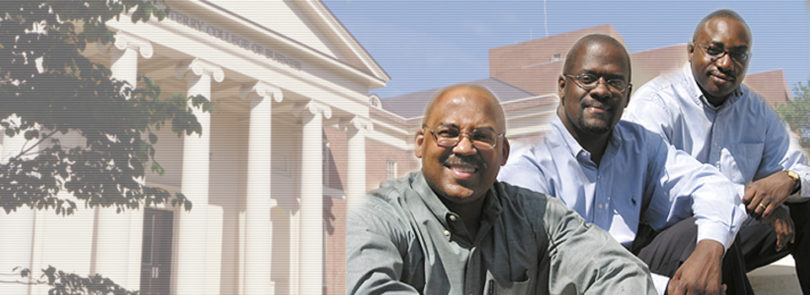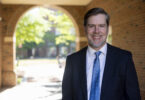While trying to decide whether to pursue a doctorate in finance at the Terry College of Business, Jide Wintoki took a number of factors into account, not the least of which was whether he thought the environment at Terry would be welcoming and supportive to him as a black man.
“As much as minority students are already outnumbered on campus, there are even fewer of us in Ph.D. programs,” says Wintoki. “All you have to do is look around to feel like even more of a minority.”
Knowing that, the Terry College has embarked on a program to enhance minority PhD recruiting that is already showing signs of success, a significant portion of which is due to the efforts of accounting professor Mark Dawkins.
Dean George Benson recently gave Dawkins the additional title of director of diversity relations, a position Dawkins himself helped formulate due to his interest in encouraging minority applications to Terry’s Ph.D. programs.
Dawkins started thinking about Terry’s strategy to reach out to minority students after being asked in 2002 to represent the college at an annual conference organized by the Ph.D. Project, a nationally acclaimed diversity program founded and funded by corporate America to encourage African-American, Hispanic-American and Native American professionals to pursue careers as business professors.
Dawkins has attended the same Ph.D. Project conference in Chicago each year since then, establishing himself and the Terry College as a dependable, recurring presence and making valuable contacts with potential students, as well as other institutions, professional organizations and corporations that might point applicants toward Terry.
Donald Wynn was already aware of the reputation of UGA’s graduate programs, especially Terry’s MIS program, but his first contact with anyone at the Terry College was an initial meeting with Dawkins at the Ph.D. Project annual meeting.
Wynn, a former BellSouth employee, relocated to Athens from Nashville with a wife and two kids, a move he says he would not have made unless he felt the environment was welcoming for African-American Ph.D. candidates.
“The faculty bent over backwards to help me get my application together,” says Wynn, who hopes eventually to win a tenured position at a university in the Southeast. While the faculty has been very supportive, he says, having an African-American professor dedicated to minority inclusion was reassuring. “If I need support as a minority student, there’s someone I can turn to,” Wynn says.
Also reassuring for minority Ph.D. candidates is seeing minorities on faculty. Dawkins says he wishes Terry’s faculty included more minorities, but it certainly represents more diversity than a lot of other comparable programs. “We’re doing better than a lot of business schools. Students want to know, ‘When I get there, am I going to see someone like me?'”








